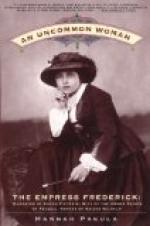Elizabeth had no more need to govern, no more occasion to tremble. She let sink the hand which, with a single stroke of the pen, could give laws to millions of men, which could give them interminable sorrow and endless torments; she again took the heavy imperial crown from her head, replacing it with wreaths of myrtles and ever-fragrant roses. She permitted Tscherkaskoy to govern, and Bestuscheff to sell to England the dearest interests of Russia. She permitted her ministers to govern with unrestricted power, and was rejoiced when no one came to trouble her about affairs of state or the interests of her people.
ELEONORE LAPUSCHKIN
Two years had elapsed since Elizabeth’s accession to the throne; for her, two years of pleasure and enjoyment, only troubled here and there with occasional small clouds of ill-humor—but those clouds overshadowed only her domestic peace. It was not the affairs of state, not the interests of her people, that troubled and saddened Elizabeth; she asked not how many of her subjects the war with Sweden had swept away; how many had fallen a sacrifice to hunger in the southern provinces of her realm. She had quite other cares and anxieties than those which concerned only her ministers, not herself. What have princes to do with the happiness of their people.
Elizabeth was a consummate princess; she thought only of her own happiness, only of herself and her own sorrows. And it was a very severe, very incurable sorrow that visited her—a sorrow that often brought tears of anger into her eyes and curses upon her lips. Elizabeth was jealous—jealous not of this or that woman, but of the whole sex. She glowingly desired to be the fairest of all women, and constantly trembled lest some one should come to rob her of the prize of beauty. And were there not, in her own court, women who might venture to enter the lists with her? Was there not, before all, one woman whose aspect filled the heart of the empress with a thirst for vengeance, of whom she was compelled to say that she was younger, handsomer, and more attractive than herself—and this one, was it not Eleonore Lapuschkin?
For two long years had Elizabeth borne about with her this hatred and jealousy; for two long years had she in vain sought to discover some punishable fault in her rival; for two long years had she in vain reminded Lestocq of his promise to find Eleonore Lapuschkin guilty of some crime. She had come out pure from all these persecuting pursuits, and even the eyes of the most zealous spy could find no blot upon her escutcheon. Like a royal lily she proudly bloomed with undisputed splendor in the midst of this court, whose petty cabals and intrigues could not soil her fair fame. Her presence spread around her a sort of magic. The most audacious courtier, the most presumptuous cavalier, approached her with only reverence; they ventured not in her presence to use such words




